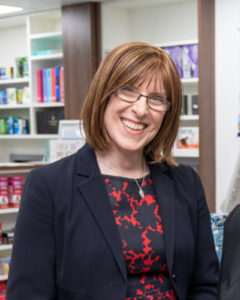
It may be the season to be jolly, but it’s also the time of year when coughs, colds and tummy bugs are more prevalent. Here, NHS 24 call handler Diane Rock (pictured below) offers advice about where to turn for help in your hour of need.
As a call handler, I’m the first point of contact for those who dial 111 for the NHS 24 out-of-hours service.
Over the festive period we get a lot of calls from people suffering from a cold – a common ailment at this time of year – and usually we would point them towards the online self-care service, nhsinform.scot, where they can use a symptom checker to find out how best to treat themselves.
Sometimes, a patient might say they have a cold but, after asking a few questions, we find out their symptoms are more serious and they may need to see a GP.
A lot of people phone for advice and aren’t aware that they can actually talk to their local pharmacist about their symptoms and how to care for themselves at home.
Usually with coughs and colds, that’s about taking paracetamol, drinking plenty of water and resting.
Quite a lot of the calls over Christmas and New Year are from people who have not remembered to collect their repeat prescription from the pharmacist before the holiday period.

We also get calls from people who haven’t got any over-the-counter medications such as paracetamol and ibuprofen at home, so these are important things to make sure you have as well as antihistamines because we have a lot of calls about rashes.
Often people who call us are looking for reassurance. As a first port of call for understanding symptoms and how to treat them you should look at our self-help guide online at nhsinform.scot
When people are able to source self-care advice online or from their pharmacist, it means services like ours can be available for those who are in need of more urgent care, especially over Christmas and New Year when GP surgeries have different opening hours and it is such a busy period.
Of course it’s natural for parents to worry when their children are unwell, and we do get calls from mums and dads in a panic. A pharmacist can look at a rash, but they can also advise on sore ears and throats, coughs and other minor ailments so they are always a good first port of call unless symptoms are serious, recurring or aren’t responding to treatment.
The good news is, most of the more common illnesses in winter will get better themselves and can be treated with over-the-counter medicines at home.
Below are some of the more typical ailments and what to do if you experience symptoms.

Winter’s most common ailments
At NHS 24 contact centres, Diane and her colleagues use a system developed by a team of senior medical advisors that includes Dr Anna Lamont, Associate Medical Director. Here Dr Lamont talks us through winter’s most common ailments:
COLDS
Most of us will be very familiar with the main symptoms of a cold – sore throat, blocked or running nose, sneezing and cough. A cold can also leave you with a high temperature and aching muscles, but usually clears up on its own within a week or two.
There’s no cure, but you can help your recovery by resting and drinking plenty of fluids, taking paracetamol or ibuprofen, using decongestants to relieve a blocked nose, and gargling salt water for sore throats.
COUGHS
Most coughs clear up within three weeks and don’t require any treatment. For more persistent coughs, it’s a good idea to see your GP so they can investigate the cause. Short-term coughs are likely to be viral so you can look after yourself at home by resting and drinking plenty of fluids. If you’re experiencing breathing difficulties or your cough is particularly severe, you should also get it checked.
STOMACH UPSETS
Tummy problems can also be common at this time of year. Nausea with vomiting and/or diarrhoea usually isn’t a sign of anything serious and tends to last only a day or two.
One of the most common causes of vomiting is gastroenteritis, an infection of the gut usually caused by bacteria or a virus that normally improves within a few days.
If you’ve been vomiting for more than a couple of days, are unable to keep down any fluids, or you have signs of severe dehydration such as confusion, rapid heartbeat and passing little urine, you should seek help from a GP, or NHS 24 if it’s out of hours.
Indigestion is also common at this time of year when people tend to eat and drink more than usual, so keeping a stock of stomach settlers at home is a good idea.
FLU
This is an infectious viral illness especially prevalent in winter, and can be spread by coughs and sneezes. Although unpleasant, you’ll usually begin to feel better within about a week.
Flu is caused by a different group of viruses to a cold and the symptoms tend to start more suddenly, be more severe and last longer. They include a high temperature, tiredness and weakness, headache, aches and pains, and a cough. If you’re otherwise fit and healthy, there’s no need to see a doctor. The best remedy is rest at home, staying warm and drinking plenty of water to avoid dehydration. Take paracetamol or ibuprofen to help ease symptoms. If they get worse or haven’t improved after a week, you should seek medical help.
EARACHE
Earache is a common problem, particularly for children, and is usually caused by a minor infection that will often get better within a few days without treatment. You can use over-the-counter painkillers to treat the pain and your pharmacist will also be able to advise on the best way of treating symptoms and may be able to recommend eardrops. You should contact your GP, or NHS 24 if out of hours, if the earache doesn’t improve within a few days, something is stuck in the ear or if you or your child have symptoms such as a fever, vomiting, severe sore throat, swelling or discharge from the ear.
MINOR INJURIES
Keep plasters and bandages at home for minor scrapes, burns, cuts and bruises. If you’ve had a nasty accident and need treatment but it’s not a life-threatening situation you can go to a minor injury unit. To find the nearest one to you anywhere in Scotland, check the Service Directory on nhsinform.scot
Medicine cabinet essentials
- Prescriptions: If you receive regular prescriptions, make sure you have enough medication to take you through the Christmas and New Year period until your GP surgery opens again.
- Pain relief: ‘Tis the season for coughs and colds, so stock up on painkillers such as paracetamol, ibuprofen and aspirin which will help to lower your temperature too if you have a fever.
- Stomach settlers: Tummy ailments such as diarrhoea, constipation and indigestion are particularly common at this time of year so keep a supply of over-the-counter medicines to help with those symptoms.
- First Aid kit: It’s always a good idea to keep a basic first aid kit at home to treat minor cuts, bruises and burns. Antiseptic cream or wipes, multi-sized plasters, bandage, gauze and tape should be top of the shopping list.
- Children’s medicines: Kids require different dosages to adults so make sure you have junior versions of essential medicines such as painkillers and cough mixtures so you know exactly how much to give them when they’re unwell.
- Antihistamines: Often used to treat allergic reactions or conditions such as rashes, antihistamines are a good thing to keep at home to help provide relief from milder symptoms.

Enjoy the convenience of having The Sunday Post delivered as a digital ePaper straight to your smartphone, tablet or computer.
Subscribe for only £5.49 a month and enjoy all the benefits of the printed paper as a digital replica.
Subscribe